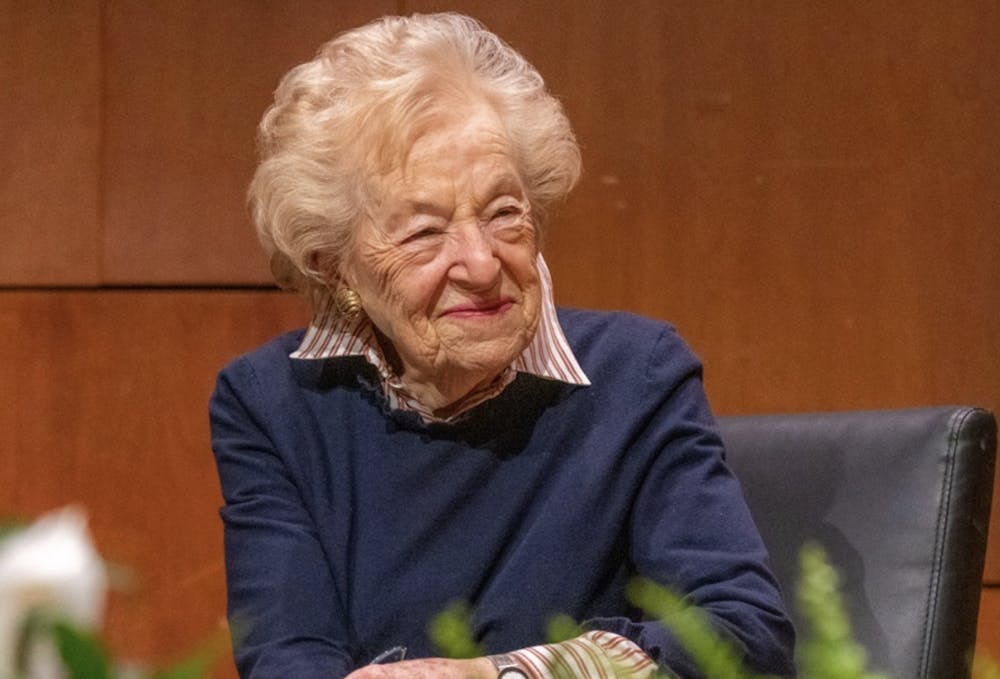Content warning: This article includes descriptions of antisemitic violence during the Holocaust.
Holocaust survivor and author Ruth Oppenheim narrated her experiences growing up in Nazi Germany to hundreds of attendees Tuesday morning at the Salomon Center DECI.
Oppenheim, who described her experiences in a memoir entitled “Beyond Survival: The Story of My Life,” previously worked at Brown for 21 years, including 15 years as office manager of the Department of English and six years as manager of the dean of the College’s office. Her keynote address kicked off the University’s annual Global Day of Inclusion, which promotes ideals of inclusion through “educational programs and engagement,” according to Sylvia Carey-Butler, vice president of institutional equity and diversity.
The day’s events, presented by the Office of Institutional Equity and Diversity, also included workshops on topics such as inclusive leadership, language related to Indigenous People, precise terminology concerning sexual and gender identity and disability in higher education, according to the OIED website.
Oppenheim, 95, began her keynote by describing her early childhood in Germany, when she often felt alienated because of her Jewish identity.
Beginning in elementary school, she recalled feeling like an outsider among her classmates. During high school, major changes began taking place in Germany, including the replacement of teachers by uniformed SS personnel, the security force of the Third Reich. Oppenheim said these changes left her “terror-stricken.”
Oppenheim recounted how the Third Reich introduced various restrictions against Jewish people, including laws preventing them from attending movies and concerts and from going to public locations such as swimming pools and skating rinks.
As the number of restrictions on Jewish people in Germany grew, so did the divisions between Jewish and non-Jewish students.
“I remember sitting in the back of the classroom, and no one was allowed to speak to me,” Oppenheim said. “During recess, I watched my classmates play while I stood alone wishing for invisibility. That remains a vivid, sad memory.”
Oppenheim noted that all of these changes took place before Kristallnacht — the Night of Broken Glass — on Nov. 9, 1938. She recalled waking up that night to the sound of loud pounding on the front door of her family’s home and a mob shouting “out with the Jews.”
Oppenheim recalled hearing her father “pleading, ‘I will come with you. Just spare my family.’” As she stood by her upstairs window, she watched him getting dragged down the street.
“Sobbing, we huddled together. A neighbor we called heard us repeat, over and over again, our pleas to God to bring our father back alive,” she said.
Later that night, while Oppenheim and her family were hiding in their home, she recalled her father returning — “streaked with blood and hunched over, holding the Torah from our synagogue,” she said.
Afraid that Nazi soldiers would return, Oppenheim and her family temporarily fled from their home that night. When they returned, they found a scene of destruction.
“Lamps were smashed, crystal lay scattered everywhere (and) books had been thrown out of the window, together with photo albums and treasured keepsakes,” Oppenheim said.
Fearing further violence and persecution, Oppenheim and her family attempted to emigrate to America. But doing so required her family to visit the American consulate in order to obtain an affidavit that would allow them to move, she said.
Oppenheim recalled feeling anxious about her immediate family’s chances of approval, remembering that her uncle was previously rejected for his stiff knee.
“Seemingly, in a wonderful land of beautiful movie stars, only flawless human beings were acceptable,” she said, describing American immigration policies at the time. “Would we be perfect enough when our time came?”
Oppenheim, her parents and her siblings arrived in New York in 1939, she said. Her father arrived in August, and the rest of her family arrived that winter.
Reflecting on her life since, Oppenheim expressed pride in her two children, four grandchildren and four great-grandchildren, all of whom were born in America.
She also fondly recalled the time she spent working at Brown. “I just enjoyed going to work and walking around campus,” she said. “It was a wonderful time.”
During the Q&A session of the event, Oppenheim noted her concern about a recent nationwide rise in antisemitism, emphasizing the broader impacts of discrimination.
“I hope that what you hear from me will make it clear that discrimination hurts all of us, and that it isn’t what our democracy should be like,” she said. “I have a mission to tell my story as long as I have some energy left to do it.”
President Christina Paxson P’19 P’MD’20, who introduced Oppenheim, cited the role that educational spaces play in honoring individuals with diverse experiences and bringing them together — “especially people who have been historically marginalized for a variety of reasons.”
Gabriel Navarro, a fund officer at RISD and one of the event’s attendees, identified the importance of empathy and understanding as two of the biggest takeaways from Oppenheim’s story.
“If you don’t talk about history, it leads to the possibility of repeating it,” Navarro said. “I think it’s really important to hear from people who have experienced hardships. There’s lessons to learn on perseverance and most importantly, inclusion and equity, particularly at a place like Brown.”

Aniyah Nelson is a university news editor overseeing the undergraduate student life beat. She is a senior from Cleveland, OH concentrating in political science and sociology. In her free time, she enjoys listening to music and watching bloopers from The Office.





